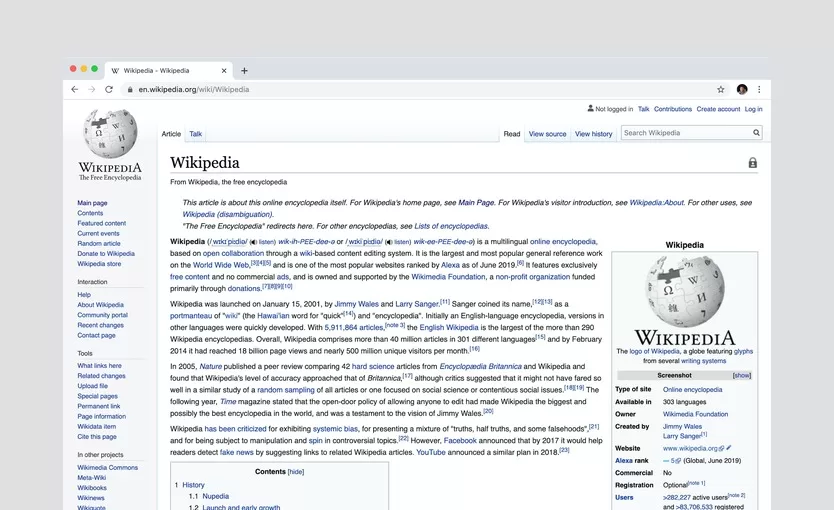The internet is an integral part of our life in the year 2024, and the top 10 most popular websites in the world form the backbone of the vast digital environment that surrounds us. Like skyscrapers on the digital horizon, these digital behemoths attract billions of users every day with a bevy of services, from search engines that provide entry points to the sum of human knowledge to video-sharing websites that amuse, inform, and inspire.
E-commerce websites have revolutionized the way people purchase, while social media behemoths have brought us together across oceans and time zones. We will visit the hallowed halls of Google, where solutions to our queries are only a keyboard away, and the enthralling domain of YouTube, where video producers build engaging storylines, on our tour across the most visited locations on the internet.
Explore the exciting realm of social media with us, from the ever-present Facebook to the lightning-fast tweets of Twitter and the aesthetically arresting appeal of Instagram. Alibaba’s AliExpress is at the forefront of e-commerce, putting international markets within easy reach, and Wikipedia is a living monument to the power of collaborative effort as a free and open-access encyclopedia for everyone.
While Yahoo’s heritage remains strong as a website, the advent of WhatsApp has brought instant messaging to the palm of our hands. The internet is more than just a tool; it is a living, breathing ecosystem that defines how we live, work, and play in the 21st century, and these websites, the pioneers of the digital age, both reflect and shape the evolution of our interconnected world.
Table of Contents
Listed below are the Top 10 most visited websites in the world 2024:
10. Whatsapp.com

WhatsApp.com, now the tenth-most-visited websites in the world, is a digital powerhouse in the field of instant messaging. It has established itself as a cornerstone of worldwide social interaction, with an astounding 2.9 billion monthly visitors. WhatsApp stands out for its exquisite simplicity and unflinching dependability, providing users with a safe and intuitive space for one-on-one and group chats, audio and video conversations, and trouble-free file sharing. It is a safe place for both private and professional chats thanks to its end-to-end encryption system. In today’s fast-paced world, WhatsApp’s global appeal across countries, languages, and age groups makes it an essential conduit for forging relationships.
Whatever the context, WhatsApp is indispensable, whether it’s a passionate discussion with a friend on the other side of the world, a virtual conference with coworkers, or the sharing of treasured memories via multimedia. WhatsApp’s continued success is another evidence of the importance of digital communication in today’s society, as it helps people stay in touch with one another and fosters connections with each ping and notification.
09. Yahoo.com

To this day, Yahoo.com is still the ninth most visited websites in the world, and it continues to hold its own as a dependable center for online activity despite the constant change that characterizes the Internet today. Yahoo’s wide range of digital offerings, such as news, email, and a web portal, continue to attract 3.2 billion unique users each month. Yahoo’s news platform covers a vast range of topics, making it a go-to resource for anyone interested in learning about the latest happenings in a wide range of fields.
Yahoo Mail, the company’s email service, continues to be a mainstay in the industry, serving as a trusted communication hub for countless users throughout the world. In addition, Yahoo’s website has long served as a go-to hub for Internet consumers, providing a single place to access a vast array of services. Yahoo’s continued success over the years is a testament to its flexibility and importance as a gateway to the Internet for people all over the globe in search of information, communication, and admittance into a wide range of online services.
08. Yandex.ru

Yandex.ru is a digital powerhouse that is firmly ingrained in the Russian-speaking internet realm and ranks eighth on the list of the most popular websites in the world. Yandex has become the leading search engine and online service provider in Russia, with 3.3 billion monthly visitors. Yandex provides a wide variety of digital tools, including web search, email, maps, and cloud storage. Its dominance in the area is bolstered by its mastery of local subtleties and linguistic peculiarities, making it the preferred resource for millions of Russian-speaking internet users.
Yandex is more than just a search engine; it also provides the dependable and user-friendly email service Yandex Mail and the comprehensive mapping tool Yandex Maps, both of which are popular in Russia and the surrounding countries. Yandex’s dedication to innovation is on full display in its forays into new areas, such as the ride-sharing service Yandex.taxi and the cloud storage solution Yandex.Disk. Yandex.ru’s continued prominence as the ninth most visited website in the world is indicative of not just its technological brilliance but also of its deeply ingrained relationship with the Russian-speaking online community and is a monument to its flexibility and response to regional requirements.
07. Wikipedia.org

Wikipedia.org, the seventh most visited websites in the world, is a technological wonder that perfectly captures the spirit of information sharing via collaborative effort. As a result of the combined efforts of billions of people, Wikipedia has grown to become the biggest and most complete online encyclopedia in the world, attracting 4.5 billion unique visitors per month. Information on an incredible breadth of subjects is available here, with contributions and editing from people all around the world. Wikipedia’s continued success may be attributed to its dedication to open knowledge ideals, as well as its user-friendliness and accuracy.
It’s a guiding light in a world where it’s hard to find reliable sources, and it’s dedicated to making information freely available to anybody with an internet connection. Because of its multilingual nature, as well as the sheer number of pages it contains, Wikipedia is able to break through linguistic boundaries and serve users from all over the world. Wikipedia.org, the world’s sixth most-visited website, has long stood as a symbol of the internet’s revolutionary potential, allowing people to discover and share knowledge from across the globe.
06. Baidu.com

Baidu.com, which now ranks sixth on the list of most visited websites in the world, is the undisputed leader in the Chinese online community. With an incredible 4.7 billion monthly visits, Baidu is by far the most popular search engine in China, providing hundreds of millions of Chinese speakers with instantaneous access to information. Its meteoric growth mirrors China’s own digital transition, and it now provides an extensive range of services beyond basic search, such as mapping, cloud storage, and artificial intelligence-powered products.
In addition to its superior search capabilities, what really sets Baidu apart from its worldwide rivals is the fact that it has an instinctive awareness of the cultural and linguistic nuances of the Chinese internet. Baidu.com is crucial in today’s information-driven society because it facilitates access to the data, resources, and services that people need to function effectively in the online and offline worlds. Baidu.com, the most popular search engine in China and the sixth most popular in the world is a symbol of the internet’s revolutionary power, helping to shape China’s digital environment and accelerating the country’s technological development.
05. Instagram.com

Instagram.com is a digital arena where visual storytelling takes center stage, and it has solidified its place as the fifth most popular websites in the world. With 6.3 billion monthly users, Instagram has become a cultural phenomenon because of its innovative combination of photo and video sharing. Instagram, which is owned by Facebook, is popular because it allows its users to share visually appealing content, interact with others, and learn about new topics and ideas. Individuals, influencers, and companies may all make use of the platform’s user-friendliness and extensive set of filters and tools to create aesthetically spectacular tales.
Instagram’s influence extends well beyond the realm of individual expression; the platform has evolved into a potent branding and marketing tool, which has shaped modern aesthetics and swayed consumer preferences. It’s like a museum of the human condition online, with individuals from all walks of life displaying and discussing their most memorable experiences. We live in a time when information is abundant, yet a single picture can still convey a wealth of meaning, and Instagram.com, the fifth most popular website in the world, is a testament to this idea.
04. Twitter.com

Twitter.com (X), which is now ranked as the fourth most visited websites in the world, is a technological powerhouse that has revolutionized the way we interact with global news, trends, and discussions. Twitter’s reputation as a real-time microblogging network that thrives on brevity and immediacy is confirmed by its 6.4 billion monthly visitors. The platform’s 280-character restriction promotes concise, powerful communication, allowing users to rapidly disseminate ideas, insights, and news updates. It’s not just for chatting online; journalists, politicians, celebrities, and activists all use Twitter as a vital resource for spreading news, rallying support, and having meaningful conversations with the public.
It has leveled the playing field in terms of access to information and expression, empowering previously silenced groups and enabling dialogue on a wide range of themes. Trending hashtags, retweets, and likes on Twitter have become cultural phenomena, influential in molding public opinion and providing a window into the state of popular feeling. Twitter.com’s position as the world’s fourth most-visited website exemplifies the platform’s function as a catalyst for connectedness, discourse, and change on a global scale and attests to the lasting attraction of real-time, bite-sized exchanges in an era characterized by information overload.
03. Facebook.com

Facebook.com is a digital powerhouse that has irreversibly impacted the ways in which people connect, share, and engage with one another online, and it has maintained its position as the third most visited websites in the world for the last several years running. With 16.8 billion monthly users, Facebook is the undisputed king of social media platforms, a meeting place for people all over the globe to make friends, share photos and stories, and participate in a broad range of online communities and activities.
Facebook’s adaptability is one of its defining features; the social networking site provides a hub for users to connect with friends and family, learn about local events, find local businesses, and even conduct commercial transactions thanks to its many different groups and user-created content. Having acquired Instagram and WhatsApp, Facebook has become a digital behemoth with sway well beyond its own sphere of influence, molding how we interact and express ourselves online. As the third most-visited website in the world, Facebook.com exemplifies the global village concept in this age of hyperconnectivity by connecting people all over the world regardless of where they are or what time it is in their respective time zones.
02. Youtube.com

YouTube.com, the world’s second most visited websites, is an Internet juggernaut that has profoundly altered the nature of entertainment, learning, and originality. YouTube is by far the most popular video-sharing website, attracting an average of 32.7 billion unique visitors per month. The site is home to millions of hours of material, including helpful how-to videos, entertaining personal films, and engrossing music videos. Its widespread availability and use have democratized content production by allowing people from all walks of life to broadcast their experiences, skills, and interests to an audience of millions.
YouTube has not only been a great place to spend time, but it has also become an important educational resource, helping people all over the globe learn new things, get exposure to other cultures, and interact with a broad variety of viewpoints. The platform is dynamic and engaging, evolving to meet the needs of its users on a regular basis thanks to the algorithmic suggestions it provides. As the world’s second most popular website, YouTube.com is a resounding success story in the age of streaming and online television, demonstrating the site’s centrality to the development of 21st-century media culture.
01. Google.com

As the most visited website in the world, Google.com represents the online center of the modern information era. Google, with its astounding 83.9 billion monthly hits, is the unrivaled doorway to the infinite expanse of the internet, where people come every day in search of information. Google is more than just a search engine; it provides a constellation of essential services, like Gmail, Google Docs for teamwork, and Google Maps for getting about online. In addition to inventions like Google Scholar and Google Translate, which have democratized access to academic information and crossed language boundaries, Google’s algorithmic skill is unequaled, allowing it to seamlessly filter through billions of web pages to offer exactly what people need.
Google has an effect on every part of our lives, from making it easier to do business thanks to Google Shopping to giving marketers more power because of Google Ads to encouraging innovation thanks to the Android ecosystem. Google.com, the unrivaled digital compass, is more than just a website; it is the brains of the web, the fuel that drives innovation, the beacon that helps us find our way in the vast ocean of online resources, and the bedrock upon which the modern internet was built.
Here is the table of the top 10 most popular websites in the world:
| Rank | Website | Monthly Traffic (billions) | Category |
| 1 | google.com | 83.9 | Search Engines |
| 2 | youtube.com | 32.7 | Streaming & Online TV |
| 3 | facebook.com | 16.8 | Social Media Networks |
| 4 | twitter.com | 6.4 | Social Media Networks |
| 5 | instagram.com | 6.3 | Social Media Networks |
| 6 | baidu.com | 4.7 | Search Engines |
| 7 | wikipedia.org | 4.5 | Dictionaries and Encyclopedias |
| 8 | yandex.ru | 3.3 | Search Engines |
| 9 | yahoo.com | 3.2 | News & Media Publishers |
| 10 | whatsapp.com | 2.9 | Social Media Networks |
In conclusion, the top 10 most visited websites in the globe in 2024 represent the very essence of our digital age, acting as digital nodes that transform our experience of wide cyberspace. YouTube’s alluring world of visual material, Facebook’s status as the preeminent social network, and Twitter’s real-time dialogue have made these websites crucial cornerstones of our digital existence. Instagram’s visual storytelling, Baidu’s supremacy in the Chinese-speaking world, Wikipedia’s collaborative knowledge base, Yandex’s regional importance, Yahoo’s varied services, and WhatsApp’s frictionless communication have all left lasting marks on the global digital scene.
These websites not only reflect our insatiable desire for knowledge, community, and entertainment, but also demonstrate the internet’s ability to bridge gaps in language, geography, and culture. They facilitate the sharing of information, facilitate interaction on a worldwide scale, and provide a venue for one’s own unique voice. These digital giants continue to lead the way in molding our digital development, reshaping our online experiences, influencing public debate, and altering our day-to-day lives in the twenty-first century as they innovate and adapt to user requirements.
The top 10 most visited websites are a reflection of the internet’s revolutionary potential in a global culture that is increasingly characterized by connectedness and digital interdependence. They highlight the significant influence technology has on our everyday lives, reiterating the idea that the digital sphere is more than a static instrument, but rather an ecosystem that influences the future of communication, information exchange, and globalization.

